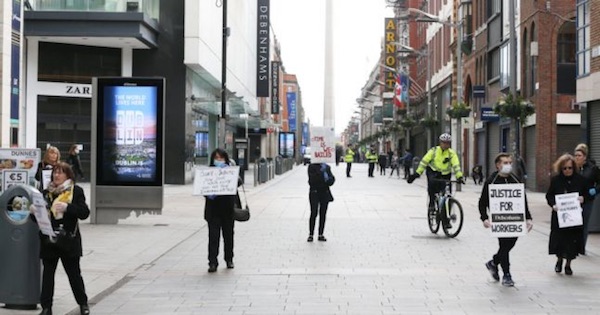
The coronavirus was used as an excuse to break up protests by retail workers this week as they sought their legal redundancy rights, despite the protestors adhering to social distancing requirements.
Gardaí said they had “taken names” of a number of people they said were “in potential breach of regulations designed to protect themselves and others in the community”, and who they said are facing prosecution.
Under emergency legislation introduced to slow the spread of the disease, people more than 2km (1.25 miles) from where they live can be arrested, and subjected to a potential fine of up to €2,500 or six months in jail.
Former workers have protested outside the retail giant’s stores across Ireland over the decision to close without a company redundancy package, some of whom have worked for the firm for thirty years. They were practising strict social distancing in Cork as they held placards outside the store but were dispersed by Gardaí for what they said was “engaging in non-essential activity”. There were similar scenes outside the main Dublin branch on Henry Street, where some protestors were also prevented from speaking to journalists.
The Irish Council for Civil Liberties (ICCL) said the Garda actions were wrong and should be reviewed.
“The right to protest, to voice dissent and dissatisfaction without fear of breaking the law, is a core tenet of a democracy,” said ICCL expert on the right to protest, Doireann Ansbro.
Garda powers to enforce public health guidelines, many vague and subjective, has led to increased police harassment and opened the door to authoritarian control.
Some checkpoints have seen a terrifying and unexplained deployment of heavily armed Gardaí and even riot police. Virtually every one has seen a failure by the Gardaí to abide by the same distancing regulations and safety measures they are demanding from public.
Some checkpoints in urban areas have now seen PSNI-style stop-and-search operations against the public, with shopping bags examined for “non-essential goods”.
Gardaí said that over the course of 17 days they arrested 76 people, issued 760 fines and placed “spit hoods” on members of the public 15 times. The Garda Ombudsman (GSOC) has received more than a hundred complaints from the public relating to the enforcement of the new restrictions.
The ICCL said it was urging the Dublin government to carry out a human rights impact assessment before any new extension of Garda powers is announced.
The assessment “should determine whether all measures meet the necessity and proportionality requirements to restrict fundamental human rights, including the right to protest”.
Meanwhile, the government has been accused of using the public as “a scapegoat” for the draconian clampdown, in an attempt to deflect from testing failures.
Taoiseach Leo Varadkar has berated Irish citizens for becoming “lax” about the rules and making it “harder to end this”, although health officials have admitted ending the lockdown chiefly depends on addressing systemic failures in testing and tracing, a process they said could take two or three weeks. The first step in ending restrictions, the return of construction work, is expected to take place on May 18.
Sinn Féin health spokesperson Louise O’Reilly said the public are happy to do their part in the fight against COVID-19 and had done everything that has been asked of them.
“They have rarely, if ever, complained and they are happy to continue to do all they can to play their part and protect public health. But what they won’t stand for is being chastised and made the fall guys for the government’s failures on testing.
“We are continuously told that we are all in this together, and if the public are doing their bit, then the government sure as hell better do theirs.”
![[Irish Republican News]](https://republican-news.org/graphics/title_gifs/rn.gif)
![[Irish Republican News]](https://republican-news.org/graphics/title_gifs/harp.gif)

